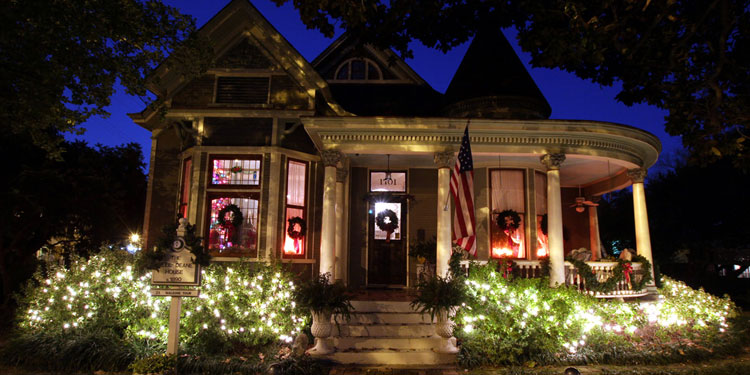
LED lights use 1/50th the electricity of conventional holiday lights and can last for three decades. Credit: Paul Barrows, FlickrCC.
Dear Earthtalk: The holidays can be so wasteful. What are some ways we can green our celebrations this year?
ANSWER: Sipping eggnog, listening to carols by the fire and enjoying the beauty of colorfully decorated homes are all warm memories the holiday season conjures. Yet with the rising popularity of Black Friday and Cyber Monday, millions of people are now increasingly absorbed in the season’s commercialism. The National Retail Federation estimates that holiday sales this year will add up to $630.5 billion. All of this shopping generates a lot of trash. According to the U.S. Environmental Protection Agency (EPA), Americans throw away approximately one million extra tons of trash between Thanksgiving and New Year’s Day.
“Simplify the Holidays,” an e-booklet from the Center for a New American Dream (CNAD), reports that nine in 10 Americans believe holidays should be more about family and caring for others, not giving and receiving gifts, yet the average U.S. consumer plans to spend more this year—about $805—on holiday shopping than last year. To help provide meaningful ways to have fun with less stuff this season, “Simplify the Holidays” includes ideas for simple gifts, low-waste wrapping, ways to connect with your children during the holidays, and more. Readers are asked to “consider creating holidays that instill more meaning into the season and encourage more sharing, laughter, creativity and personal renewal.”
“It’s not about depriving yourself of things during the holiday season,” Wen Lee, director of online media and engagement with CNAD, emphasizes. “It’s about refocusing on things that really matter, and reducing stress.”
Additional easy, stress-free ways to respect the environment during the holidays include carrying reusable totes when shopping for gifts, and using LED lights, which last 20-30 years and require 1/50th the electricity of conventional lights for decorating your tree or home. According to CalRecycle, the 2.6 billion holiday cards sold each year could fill a football field 10 stories high—fortunately, the multitude of e-cards available on the web today provide a no-waste alternative.
Further, the 33 million Christmas trees the U.S. Environmental Protection Agency (EPA) estimates are sold in North America each year don’t have to end up in landfills—some areas have recycling programs that turn Christmas trees into wood chips and mulch, and some companies will home-deliver full-size, potted live trees and pick them up after New Year’s and re-plant them. And with nearly 60 percent of Americans admitting they receive unwanted gifts during the holidays, asking friends and family what gifts they really need or want is an easy way to save waste and minimize time-consuming returns.
Greening your holiday season certainly helps the environment, but research shows it is also good for personal and family well-being. The 2002 study, “What Makes for a Merry Christmas?” by psychologists Tim Kasser and Kennon Sheldon concluded that “family and religion provided the greatest benefit to holiday well-being.” Kasser recently told the American Psychological Association (APA): “[Our study] found that to the extent people focused their holiday season around materialistic aims like spending and receiving, the less they were focused on spiritual aims…we also found people reported ‘merrier’ Christmases when spirituality was a large part of their holiday, but reported lower Christmas well-being to the extent that the holiday was dominated by materialistic aspects.”
CONTACTS: CNAD, www.newdream.org; EPA, www.epa.gov; APA, www.apa.org.
EarthTalk® is produced by Doug Moss & Roddy Scheer and is a registered trademark of Earth Action Network Inc. View past columns at: www.earthtalk.org. Or e-mail us your question: earthtalk@emagazine.com.




